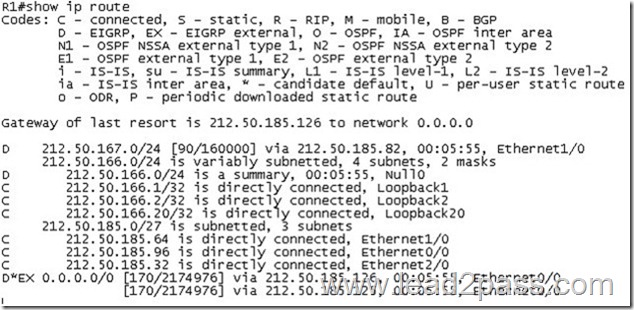[January 2018] Easily Pass 300-135 Exam By Training Lead2pass New Cisco VCE Dumps 137q
Easily Pass 300-135 Exam With Lead2pass New 300-135 VCE And PDF Dumps:
https://www.lead2pass.com/300-135.html
QUESTION 1
A network administrator is troubleshooting an EIGRP connection between RouterA, IP address 10.1.2.1, and RouterB, IP address 10.1.2.2. Given the debug output on RouterA, which two statements are true? (Choose two.)

A. RouterA received a hello packet with mismatched autonomous system numbers.
B. RouterA received a hello packet with mismatched hello timers.
C. RouterA received a hello packet with mismatched authentication parameters.
D. RouterA received a hello packet with mismatched metric-calculation mechanisms.
E. RouterA will form an adjacency with RouterB.
F. RouterA will not form an adjacency with RouterB.
Answer: DF
QUESTION 2
Refer to the exhibit. How would you confirm on R1 that load balancing is actually occurring on the default- network (0.0.0.0)?

A. Use ping and the show ip route command to confirm the timers for each default network resets to 0.
B. Load balancing does not occur over default networks; the second route will only be used for failover.
C. Use an extended ping along with repeated show ip route commands to confirm the gateway of last resort address toggles back and forth.
D. Use the traceroute command to an address that is not explicitly in the routing table.
Answer: D
QUESTION 3
When troubleshooting an EIGRP connectivity problem, you notice that two connected EIGRP routers are not becoming EIGRP neighbors. A ping between the two routers was successful. What is the next thing that should be checked?
A. Verify that the EIGRP hello and hold timers match exactly.
B. Verify that EIGRP broadcast packets are not being dropped between the two routers with the show ip EIGRP peer command.
C. Verify that EIGRP broadcast packets are not being dropped between the two routers with the show ip EIGRP traffic command.
D. Verify that EIGRP is enabled for the appropriate networks on the local and neighboring router.
Answer: D
QUESTION 4
Which IPsec mode will encrypt a GRE tunnel to provide multiprotocol support and reduced overhead?
A. 3DES
B. multipoint GRE
C. tunnel
D. transport
Answer: D
QUESTION 5
Which three features are benefits of using GRE tunnels in conjunction with IPsec for building site-to-site VPNs? (Choose three.)
A. allows dynamic routing over the tunnel
B. supports multi-protocol (non-IP) traffic over the tunnel
C. reduces IPsec headers overhead since tunnel mode is used
D. simplifies the ACL used in the crypto map
E. uses Virtual Tunnel Interface (VTI) to simplify the IPsec VPN configuration
Answer: ABD
QUESTION 6
Which statement is true about an IPsec/GRE tunnel?
A. The GRE tunnel source and destination addresses are specified within the IPsec transform set.
B. An IPsec/GRE tunnel must use IPsec tunnel mode.
C. GRE encapsulation occurs before the IPsec encryption process.
D. Crypto map ACL is not needed to match which traffic will be protected.
Answer: C
QUESTION 7
You enabled CDP on two Cisco Routers which are connected to each other. The Line and Protocol status for the interfaces on both routers show as UP but the routers do not see each other a CDP neighbors. Which layer of the OSI model does the problem most likely exist?
A. Physical
B. Session
C. Application
D. Data-Link
E. Network
Answer: D
Explanation:
CDP is a protocol that runs over Layer 2 (the data link layer) on all Cisco routers, bridges, access servers, and switches. CDP allows network management applications to discover Cisco devices that are neighbors of already known devices, in particular, neighbors running lower-layer, transparent protocols. With CDP, network management applications can learn the device type and the SNMP agent address of neighboring devices. This feature enables applications to send SNMP queries to neighboring devices. In this case, the line protocol is up which means that the physical layer is operational (layer 1) but the data link layer is not.
http://www.cisco.com/en/US/docs/switches/lan/catalyst6500/ios/12.1E/native/configuration/guide/cdp.html
QUESTION 8
FCAPS is a network maintenance model defined by ISO. It stands for which of the following?
A. Fault Management
B. Action Management
C. Configuration Management
D. Protocol Management
E. Security Management
Answer: ACE
QUESTION 9
Which three management categories are contained in the FCAPS network maintenance model? (Choose three.)
A. Config
B. Fault
C. Storage
D. Accounting
E. Redundancy
F. Telecommunications
Answer: ABD
QUESTION 10
What is the result of configuring the logging console warning command?
A. Messages with a severity level of 4 and higher will be logged to all available TTY lines.
B. Only warning messages will be logged on the console.
C. Warning, error, critical, and informational messages will be logged on the console.
D. Warning, critical, alert, and emergency messages will be logged on the console.
E. The logging console warning command needs to be followed in the configuration with logging buffered byte size to specify the message buffer size for the console.
Answer: D
300-135 dumps full version (PDF&VCE): https://www.lead2pass.com/300-135.html
Large amount of free 300-135 exam questions on Google Drive: https://drive.google.com/open?id=0B3Syig5i8gpDZmFQVlZDZnpLejA
Maybe you also need:
300-101 exam dumps: https://drive.google.com/open?id=0B3Syig5i8gpDakxVRXg3aUpmTE0
300-115 exam dumps: https://drive.google.com/open?id=0B3Syig5i8gpDM0pqaFJWUXVuM2M